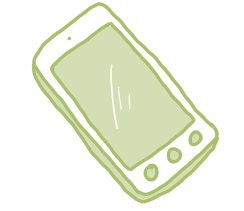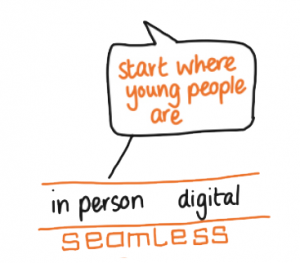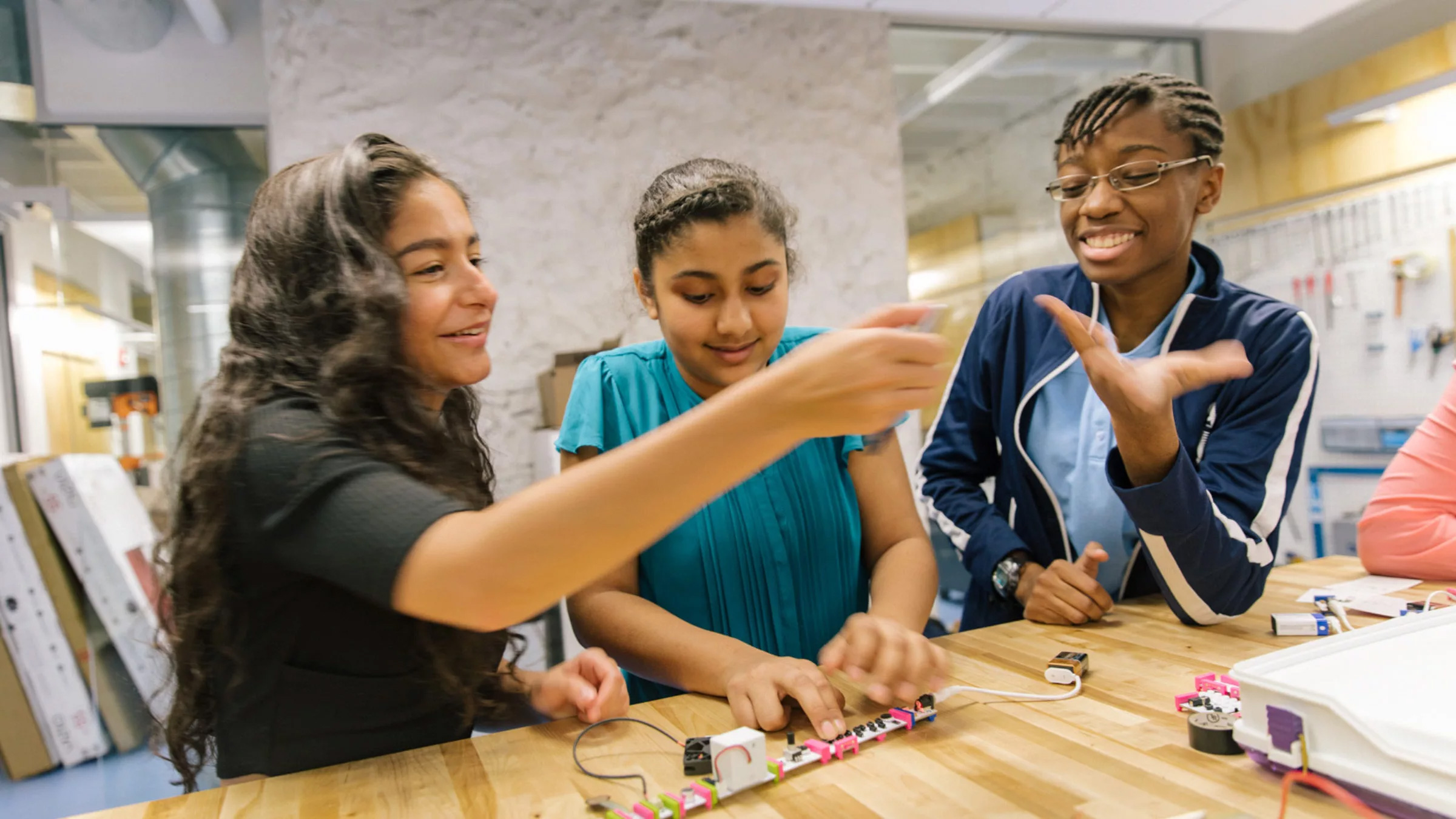Digital makerspaces could change the present and the future for young people in Scotland
The following was written by Hilary Phillips, Senior Development Officer at YouthLink Scotland, and originally posted at digitalyouthwork.scot.
Creating places where young people can enjoy exploring digital technology is a fun – but also serious – route to developing the skills that young people need for life and the expertise that our economy is crying out for.
Makerspaces are a global movement, shown to create positive “third spaces” in people’s lives. Digital makerspaces provide a way for youth workers to engage with young people, supporting them to learn key skills around coding and computer science. IT skills can provide excellent routes into a wide range of employment opportunities but being involved in a makerspace can also mean developing confidence, resilience and relational skills.youth driven drawing

There are already models for clubs and activities that are ideal in the makerspace setting: makey makey kits, dojo, raspberry pi and much more besides.
In addition, makerspaces are associated with enterprise and entrepreneurship. They often include 3D printers and access to other pieces of equipment that enable people to quickly take a business idea all the way to market. Basically they create places where people can try things, where it’s OK if they don’t work, and where there’s plenty of support to try again.
In Ireland, TechSpaces is a national project which is helping more and more young people get involved in digital. Could we do the same in Scotland, creating places where young people choose to get involved, learning skills that will change the future for them and for the nation? We think so.
A new Digital Makerspaces Learning Community
Starting in September 2021, youth workers in Scotland can take part in some peer-to-peer learning, as part of a new digital makerpaces learning community.
The learning community is being organised by YouthLink Scotland and supported by Education Scotland’s Enhancing Professional Learning in STEM Grants Programme through the Scottish Government STEM Education and Training Strategy. YouthLink would love to hear from other youth workers (staff, volunteers) in Scotland who are interested in developing the maker practice. If you are interested joining this group please contact Hilary Phillips at YouthLink Scotland at [email protected].
We asked some of those who are planning to get involved in the learning community to share some inspiration, and here’s what happened.
Digital clubs and activities at Heart of Midlothian Football club
Tanya Howden has been involved in developing a digital makerspace at Heart of Midlothian Football Club’s Innovation Centre. She says:
“Digital Makerspaces are a place for anyone to play with different tools and technology to create projects that are interesting to them. These projects might have no particular aim or outcome other than to explore topics, interests or see how things work. Makerspaces are a fantastic way to let young people lead their own learning and see the value in the mistakes that they make along the way to give them a deeper understanding and love for the subject.
“I think my first encounter of how people were doing cool things with makerspaces was when I came across a talk by Caroline Keep at an education conference. She has set up a makerspace in her school to promote learning about STEM.

“When we think about makerspaces, you maybe think about a room full of exciting gadgets and tools like 3D printers and robots but at the heart of it, a Makerspace is simply providing a safe environment where young people feel comfortable to tinker and play with different resources and maybe even collaborate with others who have a similar interest to them!
“In 2019, Heart of Midlothian FC launched a ground-breaking community initiative called the Innovation Centre. Part of this community work provides free digital education clubs and programmes to young people in the community with the aim to change how young people perceive studying and working in STEM subjects to highlight that anyone can have an interest in computing or coding. A big part of this initiative is about providing an environment where young people can get hands-on with different technology and resources that they may not have come across in school or at home with the support of friendly mentors from industry.
“I think Makerspaces can be a fantastic way to grow a community to find new interests and learn new skills to support the next generation of makers and creators!
Helping girls get in to tech
Ryan McKay has been helping get a makerspace off the ground at The Citadel in Leith. He says, “This summer at the Citadel we have been busy developing our new Girls Makerspace pilot group. Our primary aim for this group has been to support the girls in updating our art room, transforming it into a custom makerspace. The girls have taken part in Innobox training sessions to explore innovative ways of developing their ideas. They have also engaged in various STEM activities while working towards gaining their Young STEM Leader Awards.
Having their ideas for the new makerspace genuinely taken on board has instilled a huge sense of confidence. Our young people have also gained valuable employment and enterprise skills.
Moving forward I am excited to be part of the new Digital Makerspace Learning Community and I am keen to highlight the many benefits other youth organisations can have in implementing their own activities.”
This project is funded by the SSERC as part of the Young STEM Leaders Programme.
A lifeline at a critical moment
YMCA Paisley run a successful digital makerspace. Their project was co-created with local young people whose views and needs have shaped and led the activities. The Paisley Makerspace is an award winning local project which provides an exciting model for others to emulate.
One young person, David aged 18, was referred to the Paisley ymca makerspace through a referral from another youth organisation who were supporting young people just being released from HMYOI Polmont through their employability programme. One of the more challenging aspects of David’s release was trying to avoid alcohol and substance misuse which had led to his offending in the first place.

When David first started attending sessions, he was very quiet and reserved and had never created or built anything using technology. David first took part in a ‘Bare Conductive’ session where he built his own drum machine using conductive paint, cardboard, tinfoil and with this he recorded a number of stranger sounds with a sampler. David was so blown away by what he created that he wanted to take a video of it to show his family at home.
David soon felt safe and at home at the makerspace and did not feel the need for his key worker to be in attendance as he started to make friends and help out others on their projects or creative concepts. Best of all it focused David’s mind to such an extent that he did not feel the need to be distracted by drink and drugs as he believed he had found his new passion.
David attended the Makerspace for seven months and commented “Makerspace has provided me with a lifeline at a time when my head was all over the place”.
The project helped David to prepare for work by attending sessions at the makerspace developed his time keeping, project management skills as he organised much of the Synesthesia event (a public music event). Ultimately, David’s success in dealing with the transition from custody to life on the outside was due in part to his participation at the Makerspace. Once he had managed to stop using drugs, he was able to start thinking about getting a job and rebuilding his life.
Funding the future
Kraig Brown is the Partnerships and Development Manager at the Digital Xtra Fund, where their goal is for every young person in Scotland to have access to innovative and digitally creative activities regardless of their gender, background, or where they live. Describing digital makerspaces in an article in the The Herald Kraig says, “They would be fun, safe spaces where children and young people could get hands-on and learn about tech. They could discover and explore at their own pace while trying out various coding platforms or kit. The learning is informal, but educators and volunteers would provide lessons and structure just like all the other extracurricular activities we support. However, there isn’t the stress of a test or essay at the end which puts a lot of young people off trying computing when they get to Secondary.”
Many of the projects funded by the Digital Xtra Fund, including the Heart of Midlothian Innovation Centre are promoting this very concept of digital makerspaces as the best way for young people to get creative with digital.
It’s an exciting moment. If you are interested in developing digital makerspaces for young people we’d love to hear from you. Do get in touch if you’d like to know more.
Hilary Phillips – Supporting digital youth work at YouthLink Scotland

